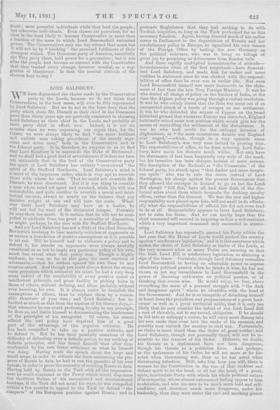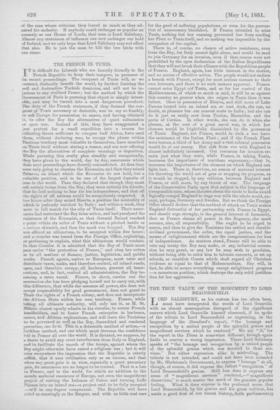LORD SALISBURY.
WE have deprecated the choice made by the Conservative party in the Lords, because we do not think that Conservatism, in the best sense, will ever be fitly represented by Lord Salisbury. But we do not in the least deny that the party which chose Mr. Disraeli as their chief in the Commons more than thirty years ago are perfectly consistent in choosing Lord Salisbury as their chief in the Lords, and probably as their party chief in effect, now. Indeed, it is not six months since we were expressing our regret that, for the future, we were always likely to find "the more brilliant and audible men taking precedence of the merely saga- cious and sober men," both in the Conservative and in the Liberal party. It is, therefore, no surprise to us to find that Lord Salisbury is to supersede the Duke of Richmond ; and we shall feel a good deal of astonishment if it does not turn out ultimately that in the lead of the Conservative party the spirit of Lord Salisbury has entirely 44 overerowed " the spirit of Sir Stafford Northcote. Lord Salisbury's mind is a mind of the imperious order, which is very apt to override those with whom he acts. That he could not override Mr. Disraeli, he soon discovered. But it is one thing to override a man whose mind sat apart and watched, while his will was indomitable, and quite another to override a moral and intel- lectual see-saw, always so nearly on the balance that any decisive weight at one end will turn the scale. What- ever fault Lord Salisbury may have as a leader, he will not fail for want of the dictatorial temper. Probably he may show too much. It is certain that he will not be com- pelled to abdicate from too great a neutrality of disposition, as might, perhaps, be the case with Sir Stafford Northcote. And yet Lord Salisbury has not a little of the ideal Saturday Reviewer's tendency to base masterly criticism of opponents on as narrow a foundation of positive assumptions as it is possible to set out. Till he himself had to elaborate a policy and to defend it, his attacks on opponents were always carefully considered so as not to imply any particular policy of his own, much less reveal what that policy was. Though a highly sardonic, lie was, so far as this goes, the most cautious of adversaries,—that he seldom opened his own lines to any counter-attack. And though you could always detect the strong caste prejudices which animated his mind, he had a very deep sense indeed of the assailability of every positive moral or intellectual principle, and great facility in picking holes in those of others, without defining, and often probably without even knowing, his own. It is always easier to demolish the assumptions of others, than to replace them by a reason- able structure of your own ; and Lord Salisbury has in- herited as much as this from the maxims of his literary days,— that whenever he can avoid professing loyalty to any principle, he does so, and limits himself to demonstrating the incoherence of the principles of his antagonist. Of course, his recent official life and policy have deprived him of a good part of the advantage of this negative criticism. He has been compelled to take up a positive attitude, and to defend it. But he has been painfully conscious of the difficulty of defending even a definite policy, to say nothing of definite principles, and has found himself time after time confronted by his own bitter criticisms on what he himself was doing. Having made the speech about the largo and small maps, in order to ridicule the fears concerning the pro- gress of Russia in Asia, he had to run the gauntlet of his own speech, in order to prove the necessity of resisting Russia in Asia. Having held up Russia to the Turk with all the impressive- ness he could command as the Power which would dispossess the thriftless Sultan of •his encumbered and overburdened heritage, if the Turk did not mend his ways, ho was compelled within a few months to appeal to the Turk to defend "the ramparts " of the European position against Russia ; and to
persuade Englishmen that they had nothing to do with Turkish iniquities, so long as the Turk performed for us this necessary function. Again, having devoted much of his earlier career in Parliament to the depreciation of Prussia and her revolutionary policy in Europe, he signalised his own tenure of the Foreign Office by hailing the new Germany as the political redeemer, who was to bring us tidings of great joy by promising us deliverance from Russian toils.
And these rapidly multiplied inconsistencies of attitude— inconsistencies often of the first magnitude—have demoral- ised Lord Salisbury, and made him far rasher and more• reckless in statement since he was clothed with the responsi- bilities of office than he ever was in earlier life. Not even Lord Beaconsfield himself was more inaccurate in the state- ment of fact than the late Tory Foreign Minister. It was he who denied all change of policy on the borders of India, at the time the Afghan policy was going through a violent revolution. It was he who calmly stated that the Zulu war arose out of an unexpected attack of a horde of savages on our settlement. It was he who defended the seizure of Cyprus on the broad historical ground that whenever Europe was disturbed, England habitually seized some now position which would give her the means of controlling the settlement of the disturbance. It was lie who took credit for the unhappy invasion of Afghanistan, as " the most momentous Asiatio war England ever waged,"—which, though in a very opposite sense to Lord Salisbury's, was very near indeed to proving true.. The responsibilities of office, so far from sobering Lord Salis- bury, have made his rhetoric much wilder. Not only have his statements of fact been frequently very wide of the mark,. but his invective has been sharper, instead of more serious. His description of the Radicals as " the Circassians " of the Liberal party, his attack upon "that darker and more danger- ous spirit " who was to rule the storm instead of Lord Hartington, his charge against the present Government that they allowed the outrages in Ireland to go on lest the Land, Bill should " fall fiat," have all had that flash of the rho-- thrice.' sabre about them which bespeaks the dashing cavalry officer, rather than the General. We fear the new and higher responsibility now placed upon him, will not avail to do effectu- ally what the responsibilities of official life did not even tend to do at all. Responsibility appears to fever Lord Salisbury,. not to calm his brain. And wo can hardly hope that the chief command will succeed in imposing on him a self-restraint which a very important command only succeeded in attenu- ating.
Lord Salisbury has repeatedly assured his Party within the last year that the House of Lords would protect the country against" confiscatory legislation," and it is this assurance which makes the choice of Lord Salisbury as leader of the Lords, at the very moment when so many Tories are assuring us that the Irish Land Bill is confiscatory legislation, so alarming a sign of the times. Certainly, though Lord Salisbury resembles Lord Beaconsfield in having an admirable power to express effectively political passion when he thinks it wise, he has not shown as yet any resemblance to Lord Beaconsfield in the power of throwing cold-water on political passion, or of thinking that course wise. He would enjoy, we fear, above everything the sense of a personal struggle with " the dark and dangerous spirit " whom he identifies with the head of the Government. And he is so incapable of detaching himself in heart from the prejudices and prepossessions of a great land- owner as well as a great territorial noble, that it is only too likely that he may consider the defeat of the Irish Land Bill a sort of chivalric, not to say sacred, obligation. If he should be led into so unhappy a course, he will carry more dismay into his own ranks than even into the ranks of his enemies, and possibly may embark the country in civil war. Fortunately, no Order is more timid than the Order of great nobles ; and Lord Salisbury, though not personally timid, will not be in-• sensible to the tremors of his Order. Hitherto, no doubt,. his threats as a diplomatist have not been dangerous,. though his threats as a politician have. And perhaps, as the spokesman of his Order, he will act more as he has acted when threatening war, than as he has acted when threatening defection. Still, take him how you will, there is menace for the Constitution in the rise of that reckless and. defiant spirit to be the head, or all but the head, of a great, mute, inarticulate Party with which his whole political nature is in sympathy, whose utmost extremes of feeling appear to him moderation, and who are sure to be much more bold and self- confident, and therefore much more dangerous, under his leadership, than they were under the cool and mocking glance. of the man whose criticism they feared as much as they ad- mired his audacity. If anybody could endanger so popular an anomaly as our House of Lords, that man is Lord Salisbury. Almost any statesman of influence can now endanger our hold of Ireland, and we only hope that Lord Salisbury may not effect that also. He is just the man to kill the two birds with one stone.







































 Previous page
Previous page